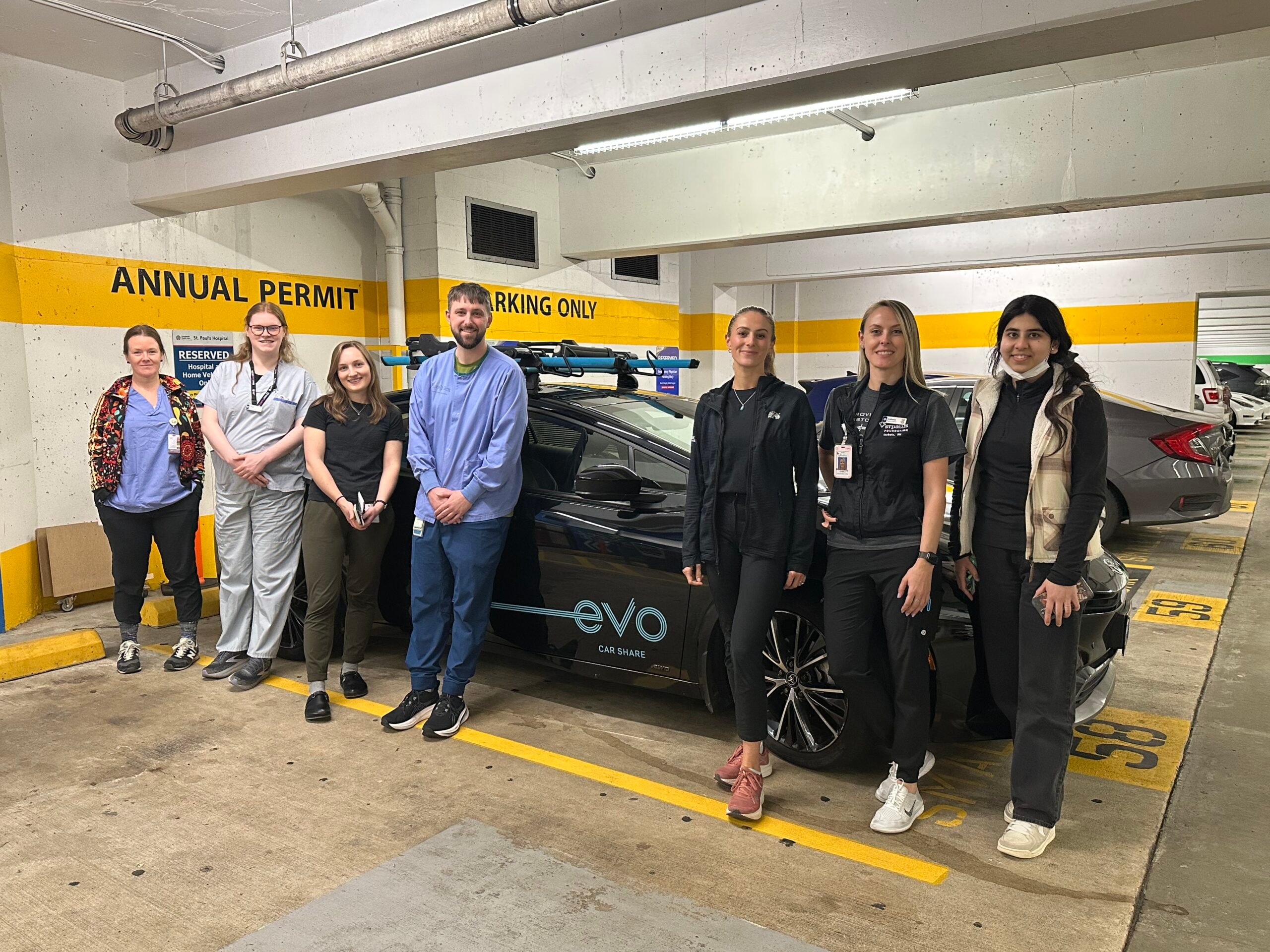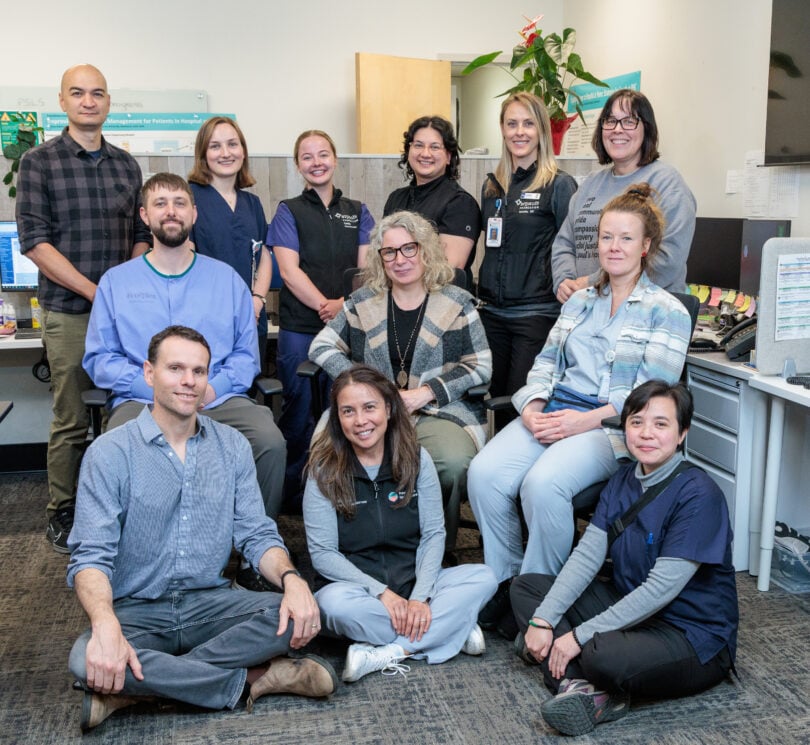Chloe Derksen had spent years working in traditional health care settings, but when the opportunity arose to join the Hospital at Home program at St. Paul’s Hospital, she knew it was the fresh start she had been waiting for. As Clinical Nurse Leader, Chloe has seen the program evolve from a promising idea into a successful model that is transforming the way patients experience care, and the way nurses practice it.
“I joined the Hospital at Home program in August 2024 because I wanted to be part of something new and innovative,” Chloe shared. “Having worked in community care before, I missed the level of autonomy and deep, ongoing patient relationships that model offered, which I wasn’t able to fully experience in acute care.” Now, a year later, Chloe’s excitement is palpable as she reflects on the impact of the program—not only for patients, but also for her own nursing career.

A new era of patient care
Since its launch in 2024, the Hospital at Home program has allowed hundreds of patients to receive acute, hospital-level care in the comfort of their own homes. This innovative model, a collaboration between Providence Health Care and Ministry of Health, has helped patients avoid long hospital stays, reduce their risk of hospital-acquired infections, and stay connected to their loved ones. Chloe has seen first-hand how this shift to at-home care leads to improved comfort, faster recoveries, and greater independence for patients.
Social worker Siobhan Gallagher, who joined the program in December 2023, agrees. “We’ve received overwhelmingly positive feedback from our patients. People are so appreciative of the fact that they can be home and receive care,” she said. “They’re with their loved ones, their pets, in their own beds, it makes a difference in their comfort, dignity, and emotional well-being.”
Collaboration at the core: advancing health through interdisciplinary practice
As Clinical Nurse Leader, Chloe is part of a team of nurses who provide both acute care and emotional support to patients in their homes. But what makes Hospital at Home truly unique is its strong interdisciplinary foundation. Social workers like Siobhan play a critical role in this model, ensuring patients receive wraparound care that addresses not just their medical needs, but also their social, emotional, and practical concerns.
“This is a committed interdisciplinary team that works closely together,” Siobhan shared. “Everyone is an expert in their own domain, but there’s also flexibility and collaboration. Clinicians support one another and often visit patients in pairs to provide more robust assessments and planning.”
Chloe echoed that sentiment. “The interdisciplinary team is incredibly strong, and I’m proud to be part of it. We’re able to build stronger relationships because we’re in the patient’s home environment. It’s a collaborative patient-provider partnership that feels different from other care settings.”
Meaningful moments with patients
It’s not just the autonomy that makes the Hospital at Home program special—it’s the profound connections that form between care providers and patients. Chloe recalls moments when patients, despite their own struggles, went out of their way to care for the nurses.
“There was one 80-year-old patient who insisted on walking the nurses to their cars after home visits, especially when it was dark outside. Another patient always had tea or coffee ready for us when we arrived,” Chloe said. “It’s incredibly touching. These little moments really highlight the impact we have on each other.”
Siobhan added that visiting patients in their homes provides a more complete picture of who they are. “It’s a privilege and a responsibility to be in someone’s personal space. You get a deeper understanding of what’s meaningful to them, and that allows us to tailor our care in a way that truly supports the whole person.”
Overcoming challenges
Providing acute care in a home setting does come with its own set of challenges. Chloe has faced issues ranging from communication barriers to patients needing unexpected levels of support. But she sees these as opportunities for innovation. “We’re quick to adapt—whether it’s using iPads to connect with patients or involving translators when needed,” she said.
Siobhan highlighted the importance of maintaining access to the same services patients would receive in a hospital. “We advocate strongly to ensure patients have access to all the consultations and services they would get in a traditional setting,” she explained. “The team’s flexibility and commitment to patient care means we’re constantly stepping up to solve problems together.”
The impact of virtual care
Virtual care technology has been instrumental in allowing the team to monitor and support patients remotely. For nurses like Chloe, that means adapting to new ways of reading cues and communicating effectively.
“Without body language cues, it’s harder to gauge how a patient is feeling during a conversation,” Chloe explained. “It requires more active listening and adaptability.”
For Siobhan, the shift to virtual and home-based care also offers benefits for the care team. “This model allows for more balance. I’m usually able to take my breaks and finish on time, and I genuinely enjoy coming in to work with this team.”
Looking ahead: growth and expansion
Looking forward, both Chloe and Siobhan see enormous potential for the Hospital at Home program. The program has already expanded beyond Vancouver to areas like Prince George and Kelowna, with plans to begin caring for surgical patients soon.
“I hope programs like this continue to grow,” Siobhan said. “The care we provide is holistic and de-institutionalized by nature. It feels more human.”
Chloe agrees. “We’ve grown so much in just one year. I can’t wait to see where we go next. The possibilities are endless.”
As the program grows, so does the need for compassionate, innovative health care professionals. Both Chloe and Siobhan encourage others to consider joining the team.
“If you enjoy autonomy, creative problem-solving, and forming meaningful relationships with patients, this is a great fit,” Chloe said.
Siobhan added, “This is definitely a job for someone who wants to work closely with an interdisciplinary team to provide excellent care. The relationships we form are built on mutual trust and respect, and that makes the work deeply meaningful.”
Curious about a new way to care?
Hospital at Home is one of many exciting ways to grow your career at Providence. If you’re interested in exploring a different model of care—one that brings hospital-level treatment into patients’ homes—visit careers.providencehealthcare.org to learn more and see current opportunities.





